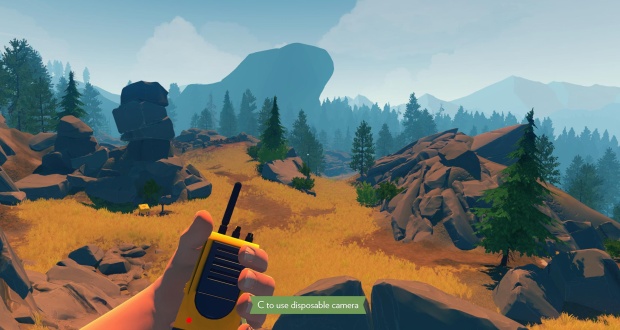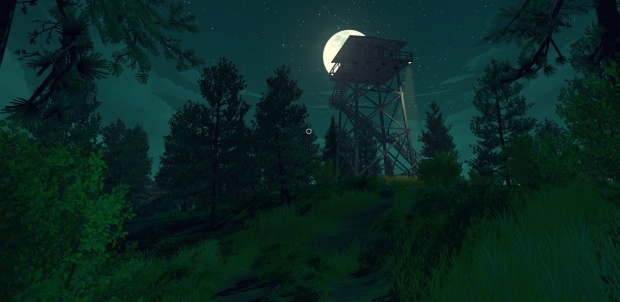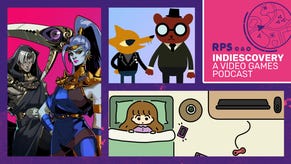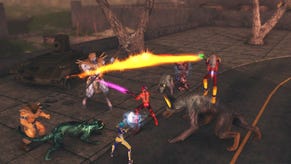RPS Advent Calendar, Dec 21st: Firewatch
Park life
Where we are, it's cold outside right now. So cold that we're all huddled around the fire, unwilling to explore the winter world. Our Advent Calendar celebrates the best games of 2016 and behind the 21st door you'll find...
It's the best use of nature in a game...Firewatch [official site]!
Pip: Apart from Subnautica, I think Firewatch might be my most screenshotted game of 2016. It's utterly gorgeous. I mean, I got real life photos developed from that game. Not just the ones you can order via the game but my own holiday snaps. I'm working on a new set which I will also get printed out as a result of the free roam mode.
I love being in the world of Firewatch so much that when I finished it the first time I immediately played it through again. It's a game which gives you breathtaking vistas, sure, but it's also a game with smaller or more subtle things I would suddenly become aware of.
One such moment which stuck with me is how the colour palette and lighting at one point managed to convey that exact time of day and time of year where a morning starts off clear and cold but you know it's going to heat up soon and all of that morning chill will be burned away. I remembered wondering whether my character would have decided to put on a jumper to be shed into a backpack later, or whether he was the sort of man to persevere through the chill so as not to need to carry an extra thing later.
The story was a harder thing for me to love – that's partly because the game kind of revolves around an understandable but not particularly lovable decision. But I liked having a more awkward relationship with the protagonist, in turn making him prickly and awkward towards his radio colleague. His interest in solitude and in escape felt appropriate and I think that his awkwardness and his rough edges actually made me more inclined to try and role play his story.
Brendan: I’m going to be the grump on this one. After reaching the end of Firewatch, I found the whole thing underwhelming. I’m happy that games as a medium are in a place where they can tell a story that is more downbeat than “troubled man with gun gets annoyed”. In that sense, Firewatch and its first-person-story kin like Gone Home are a huge forward step in terms of storytelling for games. But I still think they get too much of a free pass simply for being different.
On its own, the story of Henry as a person didn’t grab me and the ongoing mystery and red herrings of plot began to feel contrived long before the lead character started to pointlessly wonder if “any of this is real”. Everything was a bit jumbled. I loved the setting, the visual style was excellent, and the voice acting was very good. But as far as I could see, it didn’t have a clear message, purpose or theme. It was too busy leading you down one path of thinking, one possible plot, then deciding “no, that’s not the kind of story this is” and sending you down another pathway. Which, far from being some clever reference to being lost in the wilderness, I mostly found to be an aimless and dithering way to tell what ought to have been a simpler tale: “Man goes to the forest to escape personal troubles.” Not: “Man goes to the forest and gets embroiled in what may be a murder mystery or a government conspiracy or his own failing mind or I dunno I guess some story about a kid.”
Graham: But I wanted to be the grump.
OK, fine. Firewatch has some big flaws for, mainly in the unreasonable conclusions its protagonist seems too eager and quick to jump to, but I thought it should be included in the calendar anyway because it does a lot well. Sure, it's a story game with a story I agree was jumbled, but its pleasures lie elsewhere.
I loved the setting, which is as beautiful as Pip describes. I loved the voice acting, which brought its characters to life even when the script stretched credulity, and I'd happily spend another few hours with your supervisor, Delilah. I also really enjoyed the way the story was delivered, such as the little structural advances over Gone Home, including a talking protagonist and dialogue trees in which silence is an option. Firewatch doesn't get a free pass for its story, but it does a lot well and a little great.
Alec: Firewatch tried to do far too much, given that all it needed to do was promised in the earliest trailers: a lonely man in a beautiful place, trying to figure stuff out and flirting or not-flirting with an unseen dreamgirl. The murder mystery is needless, the climatic flames’n’choppers finale is a bit rich, but the existence was perfect.
Just being Henry in that place, talking to a woman who may or may not be real (I wish she were not real), making his problems my own, making my problems his.
The essential message of Firewatch, underneath the unnecessary melodrama, is that escape is also avoidance, that running away to live a dream life is a fantasy, not a real possibility. I felt that hammer blow.
To be given this wonderful place, the kind of place that I have dreamed of really escaping to, perhaps even the kind of companion that I have dreamed of having, and to gradually realise that it was not my truth, that it was not going to solve any of my problems - it hurt.
We are all Henry, looking for an answer, lost in the woods. Enjoy the sunset, but sooner or later we all have to come home.
John: Wow what a bunch of whingy-faces you all are. Firewatch is absolutely my goatee, a completely beautiful and wonderful experience from start to finish.
I find it very interesting that the game’s playing with expectations has upset everyone else so much, as if your expectations are untouchable and not to be played with. Firewatch is definitely cheeky with its implications of government conspiracies and even supernatural possibilities, but if anything this speaks equally of Henry’s desire to escape a life of sadness and mundanity as it does of the player’s assumption that a game world can only exist if it’s to provide something spectacular.
I think what Firewatch does better than anything else - better even than its wonderful aesthetic that Pip so excellently celebrates - is have you play as someone else. Sure, games let you be a muscle-clad lady from Mars Station VII, but in the end it’s a power fantasy simulacrum of you. Firewatch has you play as Henry, a middle-aged man married to a woman with early-onset dementia. A man who, before you even start playing, has made a decision with which you might feel incredibly uncomfortable: to leave her for a number of months (either with relatives or in care) and escape to the solitude of the Wyoming wilderness. That’s who you’re playing, and you have to adjust to that, rather than wrestle him into being an avatar for you.
Henry’s notional aural relationship with Delilah may seem abhorrent to you, because you want your character to be an ideal, someone who’d never consider cheating on their ailing wife, but you’re not Henry - Henry is Henry, and he’s someone in that most horrifying of situations where the woman he loved and is married to no longer recognises him. He deals with this how Henry deals with it. I cannot think of a game that so powerfully defines its central character against the whim of the player.
Then take on board that it has better acting than, well, any game ever, wonderfully smart and whimsical dialogue, a bold use of the forward progress of time, lovely emergent moments, and that it’s so bloody beautiful (the screenshots are still my desktop backgrounds, only beaten by Proteus for longevity in John’s Desktop History), and wow, you’ve got one heck of a game. I’ve adored many games this year, but Firewatch is an all-time sort of favourite. It remains the only game for which I’ve ever bought a t-shirt.
Adam: I’m arriving into this entry like a commando behind enemy lines. Shots have been fired but the defense has rallied and cleared the battleground to stand tall. And now I strike from the shadows.
There have been times in my life when I’ve wanted to run away from it all, and ‘it all’ has ranged from abuse, misery and grief to a tedious office job, but I’ve never successfully isolated myself in the way that Henry does, out on his tower in the park. We often write about the escapist element of games, letting us do things that are at odds with our everyday existence, and there’s something of that in every GTA joyride. Escapism printed onto the everyday feels very different to me than big space battles and fantasy worlds - there’s a sense of transgression when doing unacceptable things in recognisable spaces.
Firewatch takes place in a part of the world I’ve never visited but it’s real. I could go there, one day, I just haven’t yet. Henry’s story is unfamiliar to me but that need to escape from it all is at the heart of it, and that part I recognise.
Getting to know the characters was my favourite part of the game and at its best, it’s a game with time for contemplation and reflection. My favourite moments involved looking out across the park from on high, feeling at once cut off from and connected to everything around me, both the natural world and Delilah. The performances are fantastic and the park is a wonderful place to inhabit for a while.
Where it lost me a little - and only a little, but enough that I don’t think of it as fondly as John does - is in the mysteries. For me, they didn’t add to Henry’s restlessness or need to find distraction. They seemed to be created out of an anxiety about the kind of game Firewatch is - a mystery, a romance, a drama, a tragedy, a walking simulator? I think it’s all of those things to an extent and some aspects worked incredibly well for me, while others fell flat. I accepted and enjoyed exploring Henry’s relationships with his wife, with himself and with Delilah, but his sudden - and it did seem sudden, no matter what the time skips were saying - paranoia and belief that he might be the target of a conspiracy. Or at least its new focal point.
By providing a trail for him to follow, and some possible-corpses, actual-corpses and listening stations that gesture toward park backstories and moments of discovery, Firewatch stopped being about a man isolating himself from the world and his previous life, and became, for a portion of its running time, about the ways he can fix the new world he is discovering. Maybe the intent is to have another kind of escapism rolled into the initial escapism, showing Henry’s dissatisfaction with the park and the situation he apparently craved, and the ending supports that. He takes himself away from people and then fixes himself to a voice in the wilderness.
Whatever the case, the park’s former caretakers and their troubles took me away from the character study I’d been enjoying so much. I remember Henry and Delilah, and cared about them, but they were the only characters I wanted to know more about, and to hear more from.
It’s a splendid game, and one of my favourites of the year, but when the fire finally came and made me feel so small, I scrubbed a great deal of the build-up out of my mind, and have no interest in revisiting those parts ever again.












